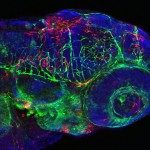Link to Pubmed [PMID] – 18370164
Methods Mol. Biol. 2008;415:337-63
Among vertebrate model species, the zebrafish embryo combines at an unprecedented level optical accessibility with easy genetic manipulation. As such, it is gaining recognition as a powerful model to study innate immunity. In this chapter, we provide a protocol for the generation of zebrafish embryos deficient in a protein of interest for innate immune signaling using antisense morpholino oligonucleotides, the systemic or local infection of these embryos with bacteria, and the assessment of various aspects of the following immune response with emphasis on microscopic observation. This example can be easily adapted to study the role of other genes, either knocked down or overexpressed, and in response to any other challenge, from purified microbial compounds to pathogenic viruses. This protocol is aimed at people not necessarily familiar with zebrafish biology and handling.
